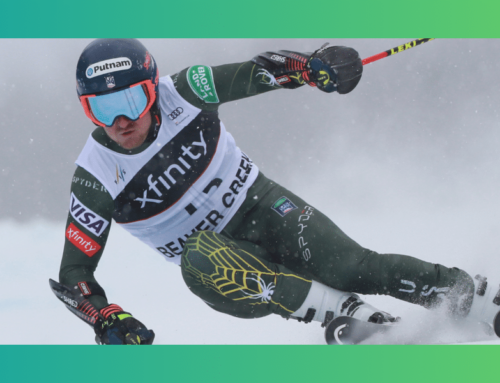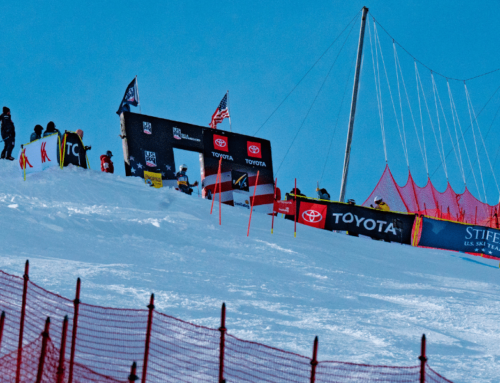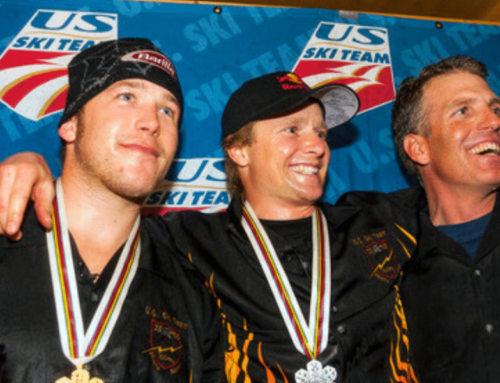Taylor: How to not get ‘iced’ when a course hold delays your run
Have you experienced this before in a race? You’re in the starting gate and ready to go physically and mentally with less than 30 seconds before you put your poles over the wand, hear the countdown, and kick out of the start. Then, all of a sudden, there’s a course hold. It may be due to an injury in the previous racer, a broken gate, a loose panel, or the need for workers to slip the course.
A course hold will happen to every racer periodically in their ski racing career. And, notably, it happened to Mikaela Shiffrin recently at a World Cup GS in Jasna, Slovakia. Mikaela held a slim lead after the first run and was ready to go on her second run, just after her archrival, Petra Vlhova of Slovakia, when there was a 2:30-minute course hold to replace a broken gate. Unfortunately, once the course was cleared, Mikaela had the 11th fastest second run and slipped to third place overall in the race.
After the race, Mikaela accused the Slovakians of “icing” her, a term from American football in which a team calls a timeout immediately before the opposing team’s kicker is going to attempt a field goal. The intention of icing is to disrupt the kicker’s routine, readiness, and focus, and give them time to think and get nervous. I should note that the limited research on icing in football has been equivocal, that is, there isn’t strong evidence that it actually.
The recent skiracing.com article about Mikaela’s reaction to the course hold produced dozens of comments both criticizing and defending her response (as usual with comments, some were quite nasty). Because I’m not a mind reader, I’m not going to wade into the speculative shark-infested waters of whether the course hold was an intentional strategy on the part of the Slovakians to rattle Mikaela on behalf of Vhlova on her home hill. But it is clear that the course hold hurt her skiing that second run.
What I will comment on though is how specifically a course hold can hurt you mentally and physically. And, more importantly, how you can react to a course hold in a way that will enable you to “stay in the game” and still have a fast race run.
Natural reaction to a course hold
Let me begin by saying that a negative reaction to a course hold is natural and even evolutionarily expected. When faced with a perceived threat (where the threat is potential failure rather than a saber-toothed tiger), your survival instinct kicks in followed by a fight-or-flight reaction. The idea is to prepare you to overcome the threat. Unfortunately, what worked on the Serengeti 250,000 years ago for our ancestors doesn’t work in the 2021 ski racing world.
So, let’s explore what that primitive, yet unhelpful, reaction is about. When you are in that finely tuned state of readiness before your race run, a course hold is a shock to the system emotionally, physically, and psychologically (in that order). You immediately experience either frustration (“How could this happen when I’m so ready to go?”) or despondence (“My run is doomed now.”). If you get frustrated, your physical intensity increases into anxiety and tension. If you feel despondent, your intensity drops like a stone and you lose your energy. In either case, you are no longer physically ready to ski fast.
Your psychology changes dramatically too. Your motivation and confidence drop because you now feel unprepared to ski your fastest. Your self-talk goes to the “dark side” in which what had been positive is now negative. Perhaps most harmfully, your focus, which had been lasered onto your race run, is now lost in the miasma of newly triggered negative emotions, physiology, and thinking.
Everything that had been on your side mentally and physically before the course hold has now turned against you. The end result of this primitive reaction to the threat that a course hold poses is a state of complete unreadiness to ski your fastest on your race run.
A positive reaction to a course hold
Thankfully, we human beings in the 21st century aren’t just beasts driven by our most base instincts. Rather, we have a thing at the top of our brain called the cerebral cortex that enables us to think, plan, consider options, and control our thoughts, emotions, and physiology. When a course hold occurs (always unexpectedly), it’s important to activate your cerebral cortex so you can produce a reaction that will increase your chances of survival as a ski racer in 2021.
Here are some steps you can take to stop the downward spiral when a course hold happens and to ensure that you maintain that precise state of readiness that you had before the course hold:
- Immediately slide back out of the starting gate.
- Talk to your coach or the racer behind you if you want to take your mind off of the course hold for a few moments so you can regroup.
- Take deep breaths (deep and calming if you had begun to feel frustration or shorter and more intense if you began to feel despondent).
- Move your body (how intensely depends on whether you need to fire up or calm down).
- Acknowledge the course hold (“Hey, s&%# happens in ski racing.”).
- Refocus on staying ready (“I can’t control the course hold; I can control me!”).
- Do mental imagery (see and feel yourself skiing fast on your race run).
- Stay positive (“You got this!”).
- When the starter calls you into the gate, take your time (they held you up; you can hold them up for a few seconds while you make your final preparations).
- Bring it!
Want to make mental training a part of your winter training program? Here are a few options:
- Read my Ski Racing blogs.
- Read my latest mental training book: Train Your Mind for Athletic Success.
- Sign up for one of my online mental training courses for racers, coaches, or parents.
- Work with me 1:1.
















